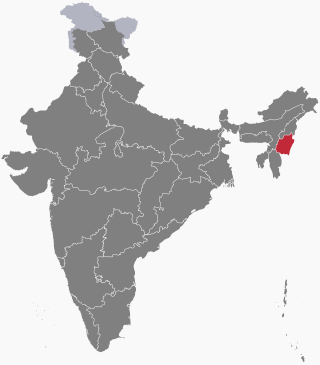Maram Naga may refer to:
- Maram Naga people, or Maram people, a Tibeto-Burmese Naga ethnic group of India
- Maram Naga language, or Maram language, a Sino-Tibetan language spoken in India
Maram Naga may refer to:
Naga or NAGA may refer to:

Nagaland is a landlocked state in the northeastern region of India. It is bordered by the Indian states of Arunachal Pradesh to the north, Assam to the west, Manipur to the south, and the Sagaing Region of Myanmar (Burma) to the east. Its capital city is Kohima and its largest city is the twin Chümoukedima–Dimapur. The state has an area of 16,579 square kilometres (6,401 sq mi) with a population of 1,980,602 as per the 2011 Census of India, making it one of the smallest states in India.

The Nagas are various ethnic groups native to northeastern India and northwestern Myanmar. The groups have similar cultures and traditions, and form the majority of population in the Indian states of Nagaland and Manipur, and Naga Self-Administered Zone of Myanmar (Burma); with significant populations in Arunachal Pradesh and Assam in India; Sagaing Region and Kachin State in Myanmar.
The Angamis are a major Naga ethnic group predominantly inhabiting the Kohima District, Chümoukedima District and Dimapur District in the Northeast Indian state of Nagaland. The Angamis are divided into four regions namely Chakhro Angami, Northern Angami, Southern Angami and Western Angami. The now separated Chakhesangs were previously known as the Eastern Angamis.
South Asian ethnic groups are an ethnolinguistic grouping of the diverse populations of South Asia, including the nations of India, Pakistan, Bangladesh, Nepal, Bhutan, the Maldives, and Sri Lanka. While Afghanistan is variously considered to be part of both Central Asia and South Asia, Afghans are generally not included among South Asians.
Maram may refer to:
The Kuki-Chin–Naga languages are a geographic clustering of languages of the Sino-Tibetan family in James Matisoff's classification used by Ethnologue, which groups it under the non-monophyletic "Tibeto-Burman". Their genealogical relationship both to each other and to the rest of Sino-Tibetan is unresolved, but Matisoff lumps them together as a convenience pending further research.
The Naga languages are a geographic and ethnic grouping of languages under the Kuki-Chin-Naga languages, spoken mostly by Naga peoples.
The Maram people, also known as the Maram Naga, are a Tibeto-Burmese Naga ethnic group inhabiting the large portion of Senapati district in the Northeast Indian state of Manipur.
The Zemeic, Zeme, or Zeliangrong languages are a branch of Sino-Tibetan languages spoken mostly in Indian state of Nagaland, Assam and Manipur in northeast India. It may have close relationship with other Naga languages pending further research. The corresponding ethnic group is the Zeliangrong people. There were 63,529 Zeliang-speaking people in India in 2011.
The Mao people, are a Tibeto-Burman major ethnic group constituting the Nagas inhabiting the northern part of Manipur and some parts of Nagaland in Northeast India.

Tangkhul is a Sino-Tibetan language of the Tangkhulic branch, spoken in 168 villages of Ukhrul district, Manipur, India. The term "Tangkhul" is derived from the Meitei language terms, "Tang" meaning "scarce" and "Khul" meaning "village" respectively. According to another theory, the term "Tangkhul" is derived from "Thankhul", meaning "Than village" in Meitei language.
Kabui Naga may refer to:
The Thangal people, also known as the Thangal Naga, are a Tibeto-Burman ethnic group inhabiting Senapati district in the Northeast Indian state of Manipur. Presently there are 13 Thangal villages. They are found in eleven hill villages of the Senapati District. Mapao Thangal, Thangal Surung, Makeng Thangal, Tumnoupokpi, Tagaramphung (Yaikongpao), Ningthoupham and Mayakhang are some of the bigger villages.
Lui Ngai Ni is the seed-sowing festival celebrated by the Naga tribes of Manipur India. The festival heralds the season of seed sowing and marks the start of the year for the Nagas and the festival was declared a state holiday since 1988.

The following outline is provided as an overview of and topical guide to Manipur:
Inpui Naga may refer to:
Monsang Naga may refer to:
Mao Naga may refer to: